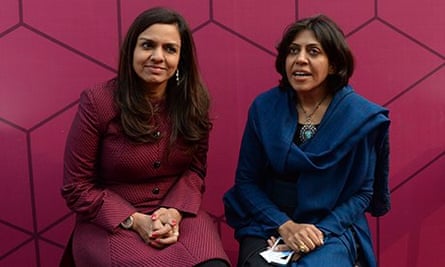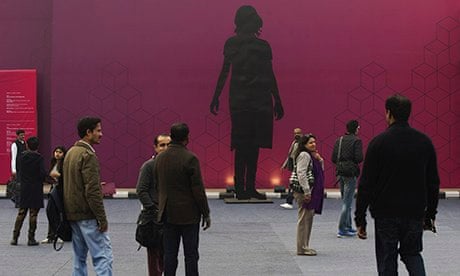Hulking figures cast in black steel towered over the India Art Fair as it opened on Friday, with the eerie silhouettes representing the country's millions of "missing" women.
The outdoor installation, M.I.S.S.I.N.G. by artist Leena Kejriwal, is a visual response to the growing gender gap in India, which has led to severe imbalances in parts of the country. Fuelled by sex-selective abortion, infanticide and the death of girls through neglect, the issue forms part of a national debate about women's rights triggered by fresh scrutiny of sexual violence.
The three outsized sculptures are meant to be "like sharp, black holes cut out of the sky. Holes into which millions of girls disappear from the face of this earth," Kejriwal says.
According to India's 2011 census, just 914 girls were born nationwide for every 1,000 boys – a figure that lags behind the global benchmark of 952 – reflecting a cultural preference for male heirs.
The India Art fair has been successful since its launch in in 2008 and draws leading local and international galleries and artists, as well as hundreds of thousands of members of the public. This year organisers signalled their intent to tackle some of the issues raised by the sweeping changes under way in the world's biggest democracy.
Another exhibit at the fair challenges a recent supreme court decision to recriminalise gay sex by reinstating an 1860 colonial law that outlaws "carnal intercourse against the order of nature".

"We are in a state of flux, in a state of change, and the art is responding to that," the fair's founder, Neha Kirpal, explains. "There is a degree of freshness and energy, a degree of revolt and rebellion sometimes. The art reflects the mood and energy of the country."
In 2010, the UN Development Programme said Asia was missing about 96 million women – the vast majority in China and India – who had died from discriminatory healthcare and neglect or who were never born at all. Meanwhile, India's women's rights movement has gained confidence over the past year after a string of horrifying sex crimes, including the gang-rape and murder of a student on a New Delhi bus in December 2012.
The domestic art market is far off its peaks of 2008, when the global financial crisis led to a slump in prices, leaving many investors who had rushed into the fledgling scene badly burned. The market for top-end pieces by established modern artists remains buoyant, as demonstrated by a recent record Christie's auction in Mumbai, but prices for the rest on the scene remain depressed, experts say.

Comments (…)
Sign in or create your Guardian account to join the discussion